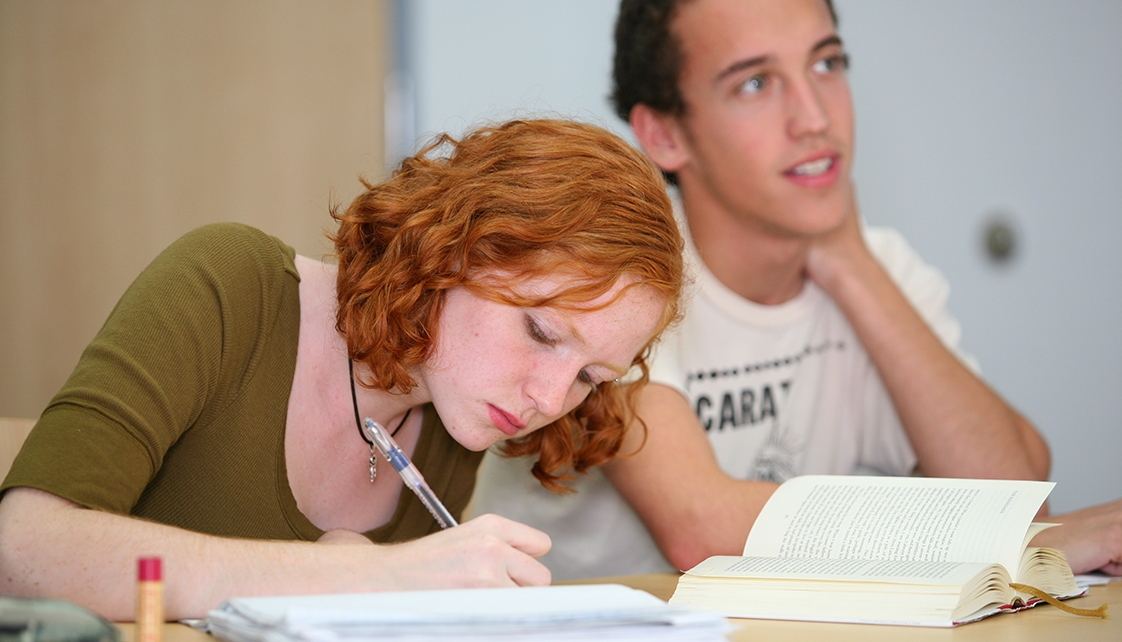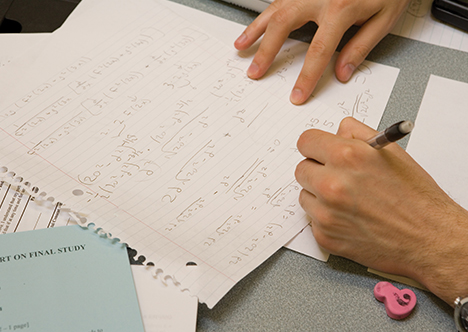- Home
- Bard Academy at Simon’s Rock
- Academic Program
Academic Program
You’ll start with an open mind, a willingness to challenge yourself, professors who are accomplished scholars (and dedicated teachers), and a program of study that is a true interdisciplinary exploration of ideas.
You’ll end up realizing there is no end—and no limit—once you start engaging in the world around you as an original thinker with a strong foundation from Bard Academy.
An enriched curriculum for an enriching perspective
 Bard Academy students work in new and invigorating ways. They study a range of disciplines
and draw connections between those disciplines. They build strong writing habits,
learning to engage in writing as a way of thinking and form of expression. At the
same time, they explore the technologies of the digital age.
Bard Academy students work in new and invigorating ways. They study a range of disciplines
and draw connections between those disciplines. They build strong writing habits,
learning to engage in writing as a way of thinking and form of expression. At the
same time, they explore the technologies of the digital age.
The skills that help you succeed in the classroom will enrich the rest of your life. At Bard Academy, you’re encouraged to bring an independent, questioning mind to reading and writing. You’re asked to challenge and analyze your own assumptions and the ideas of others. And you’re expected to infuse discussions and debates with a global perspective. In these ways, you’ll experience profound transformations in yourself and your knowledge of the world—a world that will benefit from your participation in it.
Each student fulfills core requirements with opportunities for more advanced inquiry. The Academy courses are designed and taught by the faculty of Bard College at Simon’s Rock. The Academy is accredited by the New England Association of Schools and Colleges (NEASC). Our professors are active scholars and artists, which means they have a stake in what they teach. They are also experienced teachers of younger students.
The Humanities
All Bard Academy students take a sequence of courses in English and Social Studies. In these courses, our reading drives discussion, our discussions inspire writing, and your writing is essential step in becoming a clear and persuasive thinker.
Through careful reading and writing, critical questioning and independent thinking, you’ll explore the diversity of perspectives in human experience.
You’ll read great works of literature, for example, while investigating what constitutes a literary text. Is it an object or an event? Is it “real” in the same way a brick or a tree or a molecule is real? Where can it be said to exist: on the page or in the mind? How do the technologies of reading (stone tablets versus scrolls versus books versus digital “tablets” on which we “scroll”) change our attitudes toward and interpretations of texts?
You’ll go beyond conventional questions about the meaning of a text or an author’s intention. Instead, you’ll learn to consider texts as scaffolds for experience and identity; as machinery for preserving cultural knowledge; as unstable records of the past; as material objects; and as expressions of imagination.
Meanwhile, your study of history begins in a course that takes its title from the Enlightenment scholar Voltaire: “Tricks We Play on the Dead.” History informs our understanding of the present while trying to do justice to the lives of those who came before us. You’ll study human experiences from the Paleolithic era to the early twenty-first century, while considering issues such as gender relations and sexuality, industrialization, and peaceful and hostile cross-cultural encounters.
Mathematics and the Sciences
Science courses at the Academy encourage students to investigate and observe the principles of natural and physical science, while building the groundwork for more advanced study in biology, chemistry, physics, and the environment.
You’ll design and analyze your own experiments, developing a deep appreciation of the scientific process along the way. Similarly, courses in mathematics and computer science lay the foundation for future study, while encouraging your abilities in logical thinking.
 We break from old models that consider biology, chemistry, and physics as separate
subjects. Instead, our courses begin where these sciences intersect. The classes invite
authentic investigation of urgent problems and questions by organizing the learning
process around different themes. You’ll learn scientific inquiry as both a set of
skills and a critical form of citizenship. In one course, students seek to understand
the causes of climate change and to imagine solutions to its challenges, while building
the foundation in chemistry and physics needed for college-level study. Another course
explores the science of food through hands-on learning in the campus garden, at local
farms, and through other field experiences, as well as in the laboratory where students
design their own experiments and collect, analyze, and present original data.
We break from old models that consider biology, chemistry, and physics as separate
subjects. Instead, our courses begin where these sciences intersect. The classes invite
authentic investigation of urgent problems and questions by organizing the learning
process around different themes. You’ll learn scientific inquiry as both a set of
skills and a critical form of citizenship. In one course, students seek to understand
the causes of climate change and to imagine solutions to its challenges, while building
the foundation in chemistry and physics needed for college-level study. Another course
explores the science of food through hands-on learning in the campus garden, at local
farms, and through other field experiences, as well as in the laboratory where students
design their own experiments and collect, analyze, and present original data.
Bard Academy students learn to understand mathematics as a language that describes the world quantitatively, as a set of tools to solve complex problems, and a logical and analytical way of thinking. Instead of following predetermined steps to arrive at answers, you’ll develop critical thinking skills and find your own paths to solving challenging problems. Upon successful completion of the 9th- and 10th-grade math curriculum, students will be prepared to take calculus at the college level.
World Languages
The study of at least one language is crucial to participating in and understanding global conversations, especially as innovations in new media and communications bring different cultures into closer contact. Bard Academy students choose between Spanish, French, German, and Chinese. In each case, you’ll master the basic vocabulary and fundamental structures of the language while developing listening, speaking, reading, and writing skills to increase your fluency.
The Arts
At Bard Academy, we believe the arts give us different ways to perceive and understand the world and our experience of it. Our courses combine theory and committed practice, supplemented by regular encounters with the best visual and performing arts in the Berkshire region.
The campus offers an exceptional arts facility, the Daniel Art Center, with two state-of-the-art performance spaces, an active ceramics studio with multiple kilns, multiple music practice and performance venues, a dance studio, both analog and digital photography studios, an extensive drawing and painting studio, and multiple gallery or display venues.
Students select courses in topics such as art history, music theory, and film studies, as well as a range of practicums in which they work closely with faculty and visiting artists to hone studio and performance skills. The practicum courses offer wide choices to students interested in pursuing interests in music, drawing and painting, ceramics, sculpture, dance, photography, film, and theater.
Watch: Meet Our Students - Gigi Janko
“What really shocked me…was how much everyone was expected to speak.”
-Gigi Janko